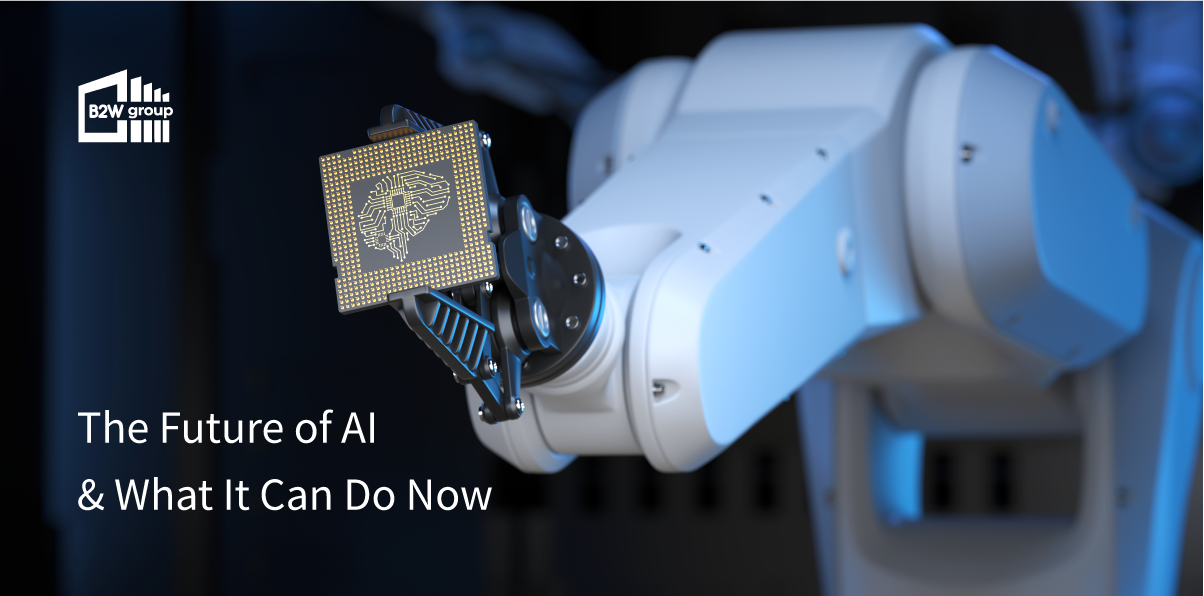
*Some sections of this blog were written by an AI. These sections will highlight red if you hover your cursor over them. Any thoughts or opinions expressed in those sections do not reflect the values of B2W or its employees.*
Unless you have lived under a rock for the last decade, you’ve probably heard around the much anticipated advances in AI. In my lifetime alone if I have seen us go from T9 Predictive Text to AI that can write blogs, create art and even drive cars. These advances in a lot of ways are great for society as a whole. They can automate complex processes such as journey planning – think GPS applications that will find the most efficient route and also take into consideration traffic levels, weather conditions and other pieces of data that may affect your journey in some way.
In the name of efficiency and convenience we have potentially created a subservient sentience that is able to interpret information, but should we be worried? Apocalyptic implications aside, there are some genuine concerns arising from the exponential growth and advancement of AI.
One major concern is the risk of an AI takeover which is not just a Hollywood film plot. As more and more data is collected, along with increasing processing power and computational speed, the potential for AI to be used as a weapon has been heavily discussed. The consequences are dire; humans could lose control of the technology and it could become used as a means of surveillance without consent or even enslavement through automation. Just like any other type of intelligence, AI can be programmed in such a way that it perpetuates some form of power struggle between humans and machines by manipulating populaces into supporting technological systems that are not necessarily equitable or beneficial. In a sense, AI might be interpreted as a way of increasing the number of power relations between humans and machines.
Job security is a big worry on a lot of people’s minds and is a concern that does have basis in reality as in short, we can’t match the consistency or accuracy that a machine can reach. 35% of companies are using AI and 42% of companies are exploring AI for its implementation in the future, according to this TechJury article – 101 Artificial Intelligence Statistics [Updated for 2023] (techjury.net).
Of course, machines can’t get bored, tired, or sick and take a coffee break either. Technology has been a huge part of the economy in the past few decades, but with all its advancements come new risks. Unemployment rates are increasing because computers can now perform repetitive tasks more accurately and consistently than humans could in the past. The rise of the robots is not just limited to manual labour; they are also working overtime as customer service representatives at call centers and financial firms. For what it’s worth though, there is no real evidence that shows that we won’t always have a job. There are a lot of people who work as baristas and car mechanics, but it doesn’t mean these occupations will become extinct in the next 100 years. We will see more jobs created in fields that rely on human interaction through digital mediums like customer service, sales, and specialized marketing. Just because we can’t replace our jobs with robots today doesn’t mean that won’t happen someday.
So, should people be worried about AI taking over? In some senses yes, as it could leave some people without a career – according to data provided by Artificial Intelligence Statistics and Facts for 2023 and Beyond | CompTIA, 38% of workers expect their job to be automated by 2023 (we’ll see if this happens). While another 13% of workers expect AI to eliminate positions entirely in their industry.
However, AI could give people more free time and no need to engage in menial tasks. Some have said that this could also lead to decreased wages, as the risk of automation would drive companies to hire fewer workers. Others claim that robots will actually be more beneficial than human workers in some cases, as they are able to perform tasks more efficiently and accurately than humans can. A study by Oxford University found that the global economy stands to gain $13 trillion from increased productivity and efficiency from automation with a net gain of $3 trillion for individuals.
All in all, your opinion on AI is more down to a matter of perspective than there being a clean divide between right and wrong. How people choose to use and exploit this fascinating technology will be the real deciding factor.

The B2W Group has a fresh approach to transforming businesses by up-skilling their current staff or bringing an apprentice into the business to add a dynamic and dedicated individual to the team. All of our courses are available through various streams of government funding so are a cost-effective way to provide high-quality training within the workplace.
Registered office in England and Wales, No:07559200
© 2020, The B2W Group, All Rights Reserved.